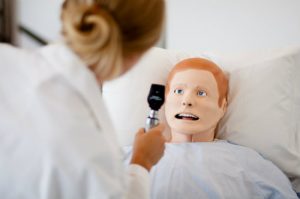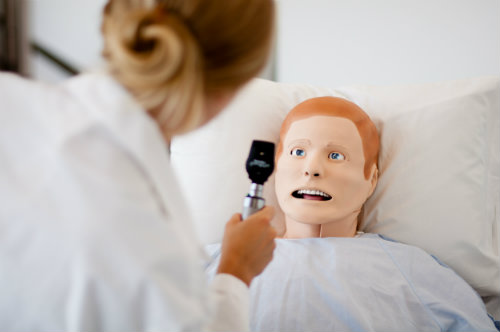The end is in sight. I’m almost finished. I’ll be done in just a few months, and then I’ll start practicing medicine for real.
 But, of course, I’ll just be a resident, so it won’t really be for real. After residency: that’s when real life starts. I know that’s true because I hear residents ask one another during their final years of residency what they are going to do once they enter the “Real World.”
But, of course, I’ll just be a resident, so it won’t really be for real. After residency: that’s when real life starts. I know that’s true because I hear residents ask one another during their final years of residency what they are going to do once they enter the “Real World.”
Talking about a time in the future as being when real life starts has the obvious implication that real life has not yet started. It is not hard for those of us who study in the Health Sciences Education Building to picture medical school as one very large simulation center since the building is almost entirely exactly that.
This mindset that medical training is not part of real life, that it is somehow separate, is pervasive in my experience. I have seen it when residents make reference to patients actually being the responsibility of the attending physician rather than the resident whose hands are touching the patient. It can be seen when a medical student overlooks some important details, and his or her first concern is how the error will be perceived rather than how to remedy the error.
Perceiving the training environment as a simulation can have dramatic effects on the care for individual patients and on the professional development of trainees. Efforts have been undertaken by many to try to address these effects. Organizations like the Gold Humanism Honor Society strive to humanize patients and remind physicians of the art of healing. There are also ongoing debates about duty-hour restrictions; some see these restrictions as diminishing the level of responsibility residents take for their patients.
There is another danger that arises, however, from the creep of this simulation mindset throughout medical education—a more devastating, far-reaching and ominous danger. It is not a danger that is directly experienced by our patients. It doesn’t even involve our patients. It is a hazard that is cultivated in us unknowingly starting the moment we publicize our desire to become a physician.
The danger is that we will begin to unconsciously see our interactions with colleagues and friends as artificial. Decisions we make in our lives outside of medical school are unknowingly perceived as tests of our commitment to medicine. Life events are therefore delayed, friends in need are ignored or overlooked, and we withdraw into the simulation awaiting the day when we will somehow emerge back into the Real World.
And this mindset is reinforced continuously, in ever-increasing intensity, throughout our medical education.
Simulation is an incredibly valuable aspect of modern medical education. But it is most valuable when we treat the simulations as being as real as possible. The more the student suspends disbelief and experiences real emotions, the more will be learned and retained. This same strategy must be applied to the rest of our medical training.
There is no finish line for training after which true reality sets in. As meaningful as the ceremony of graduation is, its passing is not the beginning of our lives, but a milestone. The interactions you have today with your friends, colleagues, faculty, patients, staff, and those you pass along the roadside are all real. So pay attention to those around you, and be the physician you always hoped you would be be someday because you are already that person.
Aaron Klassen is a 4th year medical student going into emergency medicine. Prior to medical school, he was a police officer in Tucson, and he earned a master's degree in applied biomedical and health ethics. He is married and the father of two boys.

